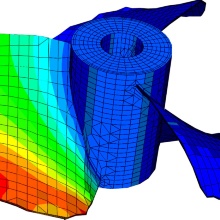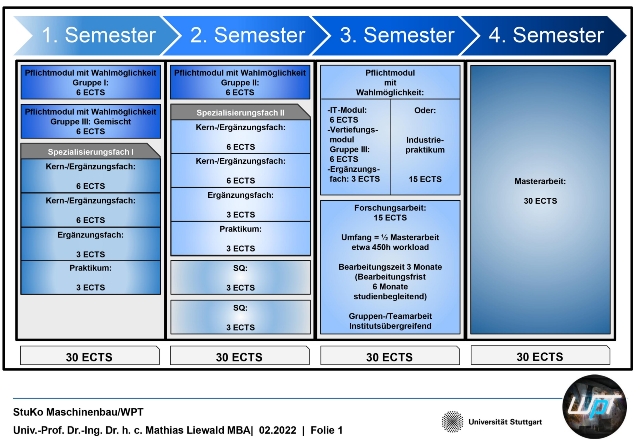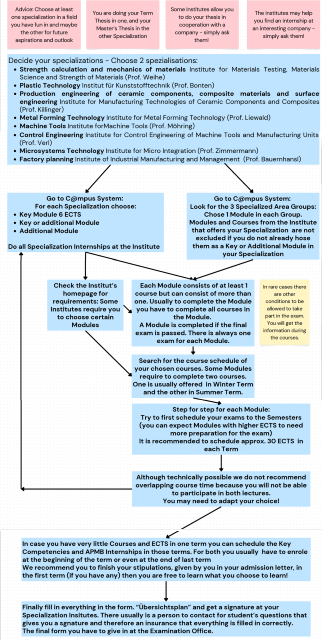Materials and their production form the basis of all technical products and thus one of the most important foundations of modern life. Material production, processing and recycling will become even more important in the future, as the global resources of raw materials to use for material production are limited and therefore a circular economy and sustainability have become an essential part of education at the University of Stuttgart. Our research topics address the future production and processing of raw materials, focusing on ensuring a sustainable future for society.
Current research topics include:
- CO2-neutral production and processing
- Value-preserving and value-enhancing recycling
- Autonomous and sustainable production approaches
- Extreme lightweight construction with a view to production processes and material engineering
- Smart materials / new materials at the nano and micro levels
In the future, specially trained engineers will be required, who have a background in material science and a sound knowledge of production technology. An emphasis on interdisciplinary education forms an essential part of this.
Experience gathered in recent years has shown that students at the University of Stuttgart graduate in an excellent position for entering the national and international job markets.
Introduction by Prof. Liewald, dean of studies.
Are you passionate about materials and fascinated by the application of different production techniques? Do you enjoy researching different manufacturing techniques and new material technologies? Are you interested in discovering what a material looks like from the inside, how certain material characteristics are developed and how all this information is combined to create a product using different manufacturing technologies? Then come and join us!
You will learn to apply your creativity and systematic thinking skills to solve the problems of the future in the field of materials and production engineering. In this regard, our Master's study program at the university is very different from those at other universities.
Career opportunities for graduates of the MPE Masters-Program are excellent. The unique combination of free to choose Specialization Subjects and Key Modules allows for specialization in areas of true personal interest, as well as expanding your knowledge into related topics of other fields. In addition to that there are numerous cooperation’s between institutes of the University of Stuttgart and manufacturing companies, allowing for close relations regarding potential student thesis or future career opportunities.
- BERUFENET
You can find further information on job opportunities on this website
Studying abroad: what opportunities does my study program offer?
What options do I have?
It is possible to study abroad in the MPE master’s Program. You may choose to
- study abroad for a certain, limited, amount of time.
- graduate in a Dual Master’s Program.
1. Studying Abroad:
The macrostructure of the MPE masters allows for several options to study abroad. If you want to know more about that, it is always a good idea to contact the professors responsible for your specialization subjects. They have connections to other Universities and can help mediate a spot in one of those Universities. Sometimes it is worth visiting the websites of the responsible institutes for more information about potential cooperations.
| Country | University | City |
| France | École Supérieure des Sciences et Technologies de I`Ingenieur de Nancy (ESSTIN) | Nancy |
| France | Institut National des Sciences Appliquées de Lyon (INSA) | Lyon |
| France | Université de Technologie de Troyes | Troyes |
| United-Kingdom | University of Strathclyde | Glasgow |
| Itali | Polytecnico di Milano | Mailand |
| Poland | Lublin University of Technology | Lublin |
| Sweden | Lulea University | Lulea |
| Sweden | University of Linköping | Linköping |
| Spain | Universidad Jaume I | Castelló de la Plana |
| Spain | Universidad Politécnica de Madrid | Madrid |
If you want more Information about opportunities to study abroad, you can visit the website of the Institute for Materials Testing, Materials Science and Strength of Materials (IMWF). Here you can get information about the ERASMUS-Program as well as the ISAP-Program. Just follow this Link!
Yet another option you have is the Institute of Industrial Manufacturing and Management (IFF). They have cooperations with the following universities.
| Country | University | City |
| Spain | Universitat de Barcelona | Barcelona |
| Romania | Universitatea Politehnica din Bucuresti | Bukarest |
| Romania | Universitatea Politehnica din Timisoara | Timișoara |
| Italien | Università degli studi di Napoli Federico II | Neapel |
For further information you may contact Mrs. Cornelia Schott.
The Institute for Manufacturing Technologies of Ceramic Components and Composites (IMTCCC) is also offering ERASMUS-Programs. You can find them in the following chart:
| Country | University | City |
| Itali | Università degli Studi di Modena e Reggio Emilia | Modena |
| Itali | Politecnico di Torino | Torino |
| France | Universite de Limoges (Sonderprogramm: INTERNATIONAL SEMESTER) |
Limoges |
| France | Institut Catholique d'Arts et Métiers (ICAM) | Toulouse, Nantes, Lille |
| Sweden | Stockholms Universitet (Only for student-thesis (specialisation subject)) | Stockholm |
| Spain | Universidad Politécnica de Cartagena | Cartagena |
For further information you may visit the IMTCCC website (IMTCCC) or you can contact their Erasmus-coordinator Betina Osswald.
The industrial internship offers you the opportunity to not only gather factual qualifications but also social and economic insight into a foreign country. The Internship Office has put together an extra paragraph for internships in foreign counties in the internship regulations. There you can find companies that are capable of conveying internships abroad. You can also find further information about internships in foreign countries on the homepage of the Internship Office or by following this Link.
Also, you can find general information about applications, mentorships, and counselling on this website
2. Dual Masters-Program
Since 2005 there is the possibility to get a dual master’s degree in cooperation with the Universidad Politécnica de Cartagena in Cartagena. You can get further information by following this link or by contacting Mrs. Ebru Gyoktepeliler Akin.
Appointments by arrangement.
How is the program structured?
At the University of Stuttgart, we place a paramount emphasis on fostering individual development and personalized learning experiences, aligning with our overarching goals of interdisciplinary knowledge coupled with a clear specialization in Material Science and Production Technology. Diverging from traditional teaching methods commonly seen in high school settings with fixed timetables, we have designed our study program to provide you with unprecedented flexibility.
Our innovative approach allows you to craft your educational journey by choosing from various specializations within the realms of Material and Production Engineering sciences. Whether you are inclined towards a more focused exploration of Material or Production science or if you aspire to navigate the practical realms through internships versus delving into the theoretical aspects via additional courses, the choice is yours.
This flexibility extends beyond just choosing your specialization. You have the autonomy to determine the sequence of your study program, catering to your unique learning style. At [University Name], you are your own manager in this academic pursuit. We understand that each student's path is distinctive, and we are here to support you at every turn, ensuring that your educational journey aligns with your aspirations and learning preferences. Whether you lean towards a more practical or theoretical approach, our commitment is to empower you to shape your academic experience in a way that best suits your individual goals and ambitions.
Structure of the Study Course
The study program is structured to provide a comprehensive and flexible educational experience. As highlighted in the accompanying video (main page), the curriculum spans 120 ECTS credits distributed across four semesters. A tentative example of a schedule, evenly distributing the 120 ECTS over the four semesters, is illustrated in the graphic below.
It's crucial to note that the emphasis here is on the term "example." We recognize and celebrate the diversity in learning preferences and academic goals, allowing you to tailor your study program to suit your individual needs and aspirations. The following page serves as a guide to navigating the myriad possibilities available to you, offering an overview of the various choices you can consider.
How to plan your Study Course
To optimize your start in the study program, we recommend beginning with a focus on your general specializations. This foundational approach allows you to gradually delve deeper into specific details as your study plan evolves. By concentrating on these general specializations initially, you can build a strong foundation and gain a broad understanding of the material. As you progress, the flexibility of our program empowers you to refine and adapt your course selections, ensuring that your academic journey aligns seamlessly with your evolving interests and career objectives.
As you can also see in the course schedule, your studies contain:
- two Specialization Subjects (18 ECTS each)
- three Specialized Areas (6 ECTS each)
- Two Key Competencies (3 ECTS each)
- An internship (15 ECTS) or
- A Key Module (15 ECTS)
- A student thesis (15 ECTS)
- A master’s thesis (30 ECTS)
- Suggested schedule
suggested schedule
Important Websites
Accreditation
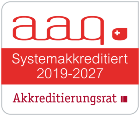
Contact for further questions
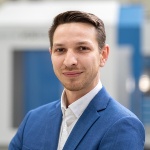
Lukas Hauser
M.Sc.Wissenschaftlicher Mitarbeiter



